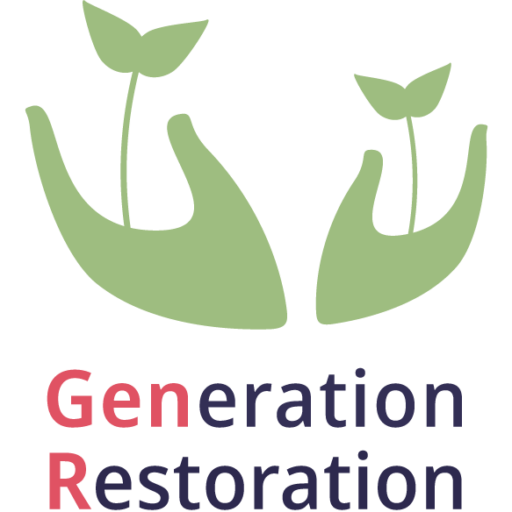
Generation Restoration Roundtable 2024 in Uganda
On August 19th, 2024, Generation Restoration e.V. organized a roundtable with 30 participants from various organizations at the Social Innovation Academy (SINA) in Mpigi, Uganda. Generation Restoration e.V. aims to actively serve as a bridge builder, connecting and supporting the inspiring initiatives that exist within marginalized groups, including both refugees and host communities. Harnessing the experience of grassroots actors, combining common approaches or objectives, framing those for standard-setting, and – ultimately – approaching international organizations for policy definitions are at the forefront of Generation Restoration e.V’s efforts.
«What if we could transform refugee camps
into regenerative communities?»
The first in-person roundtable marks the beginning of a series of discussions eagerly dedicated to bringing this vision to life. Hence, the question, «What if we could transform refugee camps into regenerative communities?» is not merely preceding its question mark, it is a provocative statement of which its positive effects have been identified and seized to grow by all participants present at the roundtable.
Video impressions of the Generation Restoration roundtable in August 2024 in Uganda.
Key Questions & Discussions
The implementation of regenerative practices has been assessed by grassroots experts, raising the question:
«What are the learnings from regenerative practices in refugee camps?»
Given the identified manifold opportunities of regenerative solutions, the question arises:
«How can we multiply and scale regenerative solutions?»
As the discussion evolved, participants highlighted the effectiveness of train-the-trainer programs. Combined with demonstration centers and model frameworks, they can help to scale the positive impacts of regenerative solutions. To unfold their potential, relevant and locally supported co-creation of innovations with beneficiaries is advised. Research and (baseline) studies can help to better understand the circumstances of the target groups as well as the effectiveness of technologies. Education for the local communities and authorities is equally as important and very much needed. Promoting best practices requires effective documentation and information dissemination, with a focus on social media engagement. Building collaborations and partnerships through stakeholder mapping is essential to support a strong movement structure. Additionally, agricultural processes need to be rethought for further advancement. Regenerative agriculture means preferring OPS (open-pollinated seeds) over hybrids or GMOs (genetically modified organisms). Even seeds from the 1970s and 80s can still replicate themselves and multiply local seed production, contributing to self-sufficiency and the exchange of seeds among farmers and organizations. The group came up with the idea of a “seed production and conservation” working group.
In order to advocate for regenerative solutions on a framing and standard-setting level, proof of concept is key. Hence, the question is:
«How can we measure and evaluate the impact of such regenerative solutions?»
Each organization developed its own method of regeneration and consequently defined diversified measures. This leads to a higher weight of the overall proof and intensified self-development. Overall, this approach enhances standard-setting while allowing each grassroots organization the flexibility to grow and adapt.
Network: Participating Organizations & Common Goals
UNIDOS Social Innovation Center
Turning refugees into change makers – that is the goal of the Unidos Social Innovation Centre. In the Nakivale Refugee Settlement in South West Uganda the refugee-led organisation aims at empowering young refugees with entrepreneurial skills.
“Our vision is to completely transform our refugee camp into a regenerative community, where everyone will become self-sufficient. We firmly believe that through developing strong entrepreneurial skills, we will be able to co-create, build resiliency and turn the hard and often painful situations that adversely impacted us in our home countries, into stories of success”, says founder Paulinho. Through the application of permaculture these determined refugees do not only regenerate soil and ecological environment but also their own lives and the community.
Contact Person:
Paulinho Muzaliwa, founder and director of UNIDOS
More infos on UNIDOS.
Nature and Creativity for the Future Generation (NCFG)
Indigenous NGO is working with farmer communities with less resources in Uganda. We are a member of Green light future Union which is a consortium focusing on agroecology. NCFG promotes agroecology, seed regeneration, use of available resources, environmental conservation methods, and safe water in communities.
We have a demonstration farm to showcase what we preach. Agriculture students use it as a practicing classroom. Roundtable discussion on refugees and restoration is important for us to share our experiences, expertise, challenges, and solutions as we aim at environment restoration.
Kind regards
Francis
Partners Empowering Agro-ecology and Community Education (PEACE)
We are a community-based organisation (CBO) found in Buikwe District, village Bukaya. Majorly with a focus in Agro-ecology which involves environmental conservation, recreation through raising nurseries and tree planting and empowering local smallholder farmers.
Vision: To promote Innovativeness and Climate Action.
Mission: To promote tree planting to smallholder farmers through raising our own nursery beds and by giving out free
seedlings 🌱 to farmers, Rotary Clubs, schools, and the government. places etRotarian
Contact Person:
Peter Kibuuka, Rotarian, Director PEACE
Eco Mamas Uganda
Eco Mamas Uganda: Our mission is to enhance the quality of living for youth, women and families in poor rural areas through education involving environmental sustainability, permaculture, holistic nutrition, herbal medicine, yoga and healthy food preparation.
We are developing a community resource and learning center. We are currently working on the first phase of the construction of the house based on a permaculture concept that will accommodate students, teachers and other guests. We wish to connect with organizations and individuals who are willing to share knowledge or contribute financially in the construction of the house that will help facilitate, trainings and accommodation.
Yours sincerely,
Adam Suleman, Project Coordinator Eco Mamas Wakalenge Ecovillage
Your Project is Missing?
If you want to share your work with the roundtable network, please send us your organization or project description to vorstand@gen-r.de and we will add it to this online document here.
Coordinating these efforts is the motivation and reasoning behind the establishment of Generation Restoration e.V.
Several action points and challenges have been identified by the participants that will be the basis for our second roundtable on November 14th, 9am EAT online (Zoom).
